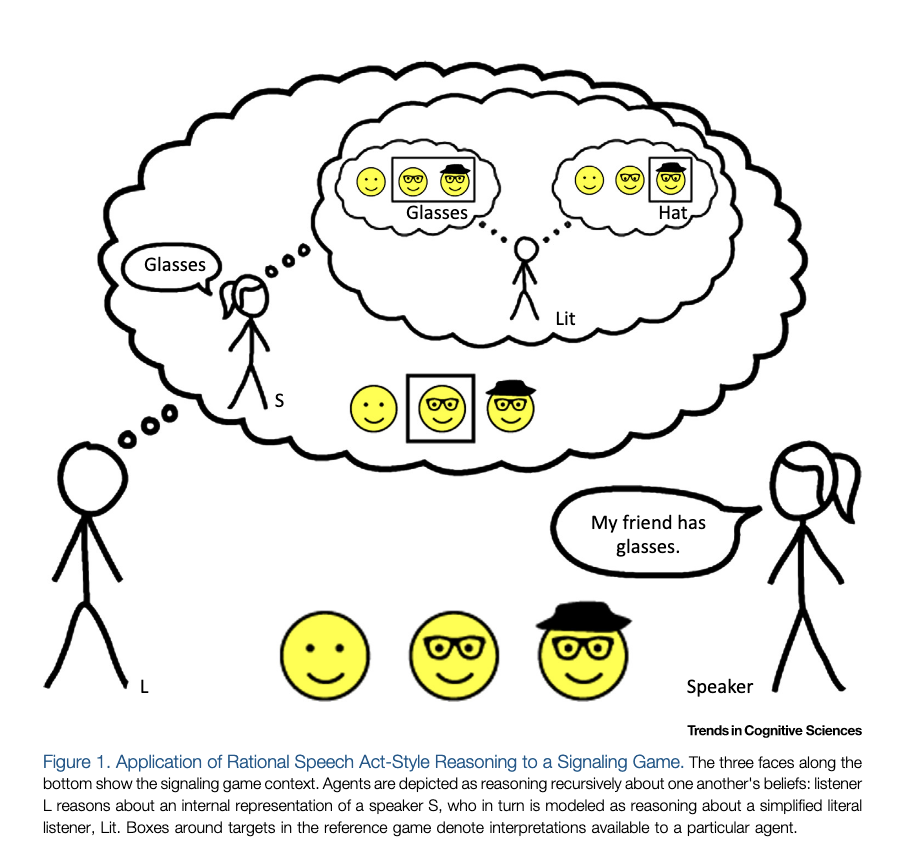Overview
The Rational Speech Acts (RSA) framework aims to model how people make pragmatic inferences beyond the literal semantics of language—essentially formalizing Gricean pragmatics (e.g., @1975griceLogic). In this situation, we have two agents:
- A speaker who is knowledgable about some states and their distribution , and produces “utterances” from a fixed set with conditional probability for all and .
- A listener who, for all possible utterances , maintains a distribution over all .

In RSA, speakers are boundedly rational agents who optimize the trade-off between informativeness and utterance costs. Speakers make utterance decisions simulating a listener’s distribution , then selecting the message that is most likely to induce beliefs about the true world state.
Different listener models correspond to different speaker utilities:
| Listener type | Description | Implementation | Speaker utility (of an utterance) |
|---|---|---|---|
| Literal | Interpret utterances according to “lexical meanings” : | Uniform distribution over possible world states. | Listener’s gain about the true world state after hearing the utterance: |
| Pragmatic | Formalize Gricean pragmatics and account for the relevance of an utterance. | Recursively embed a speaker model, which in turn embeds a literal literal listener: | Open research question. |
Basic implementation
Let be a set of world states and be a fixed set of utterances.
- The pragmatic listener’s inferred world state is conditioned on speaker choosing utterance :
- The speaker chooses and utterance in proportion to the expected utility gain (i.e., approximately rationally), where represents the extent to which utility is maximized (i.e., how rational the speaker will be):
- The speaker utility is determined by how certain a literal listener becomes about world state after hearing utterance :
- The literal listener updates beliefs about the world under the assumption that the utterance directly corresponds to a true semantic denotation :
Variants
A resource-rational perspective for (joint) communicative success, after @2025icardResource
Continuous semantics, after @2020degenRedundancy
Integrating epistemic utility with decision-theoretic in speaker utilities, after @2024sumersReconciling
- The truthfulness, or epistemic utility, of an utterance is defined as a penalty on false utterances, with threshold determined by the speaker’s softmax optimality (around is a preference for true utterances, while “recovers a more typical RSA constraint to true utterances):
- The listener’s posterior is the expected reward for taking an action . Reward is a scalar value obtained by conditioning the learner’s beliefs about the world state on the utterance, then marginalizing over worlds:
- The listener’s decision policy is a softmax over beliefs that chooses from actions according to their expected utility:
- The relevance, or decision-theoretic utility, of an utterance is defined as the expected utility of the listener’s decision policy after hearing it; informally, more relevant utterances induce beliefs that improve listener decision-making:
- The speaker utility is a convex combination of truthfulness (epistemic accuracy) and relevance (decision-theoretic utility) with a cost term: